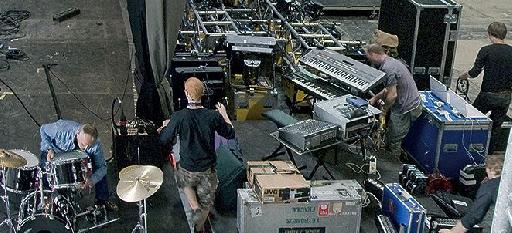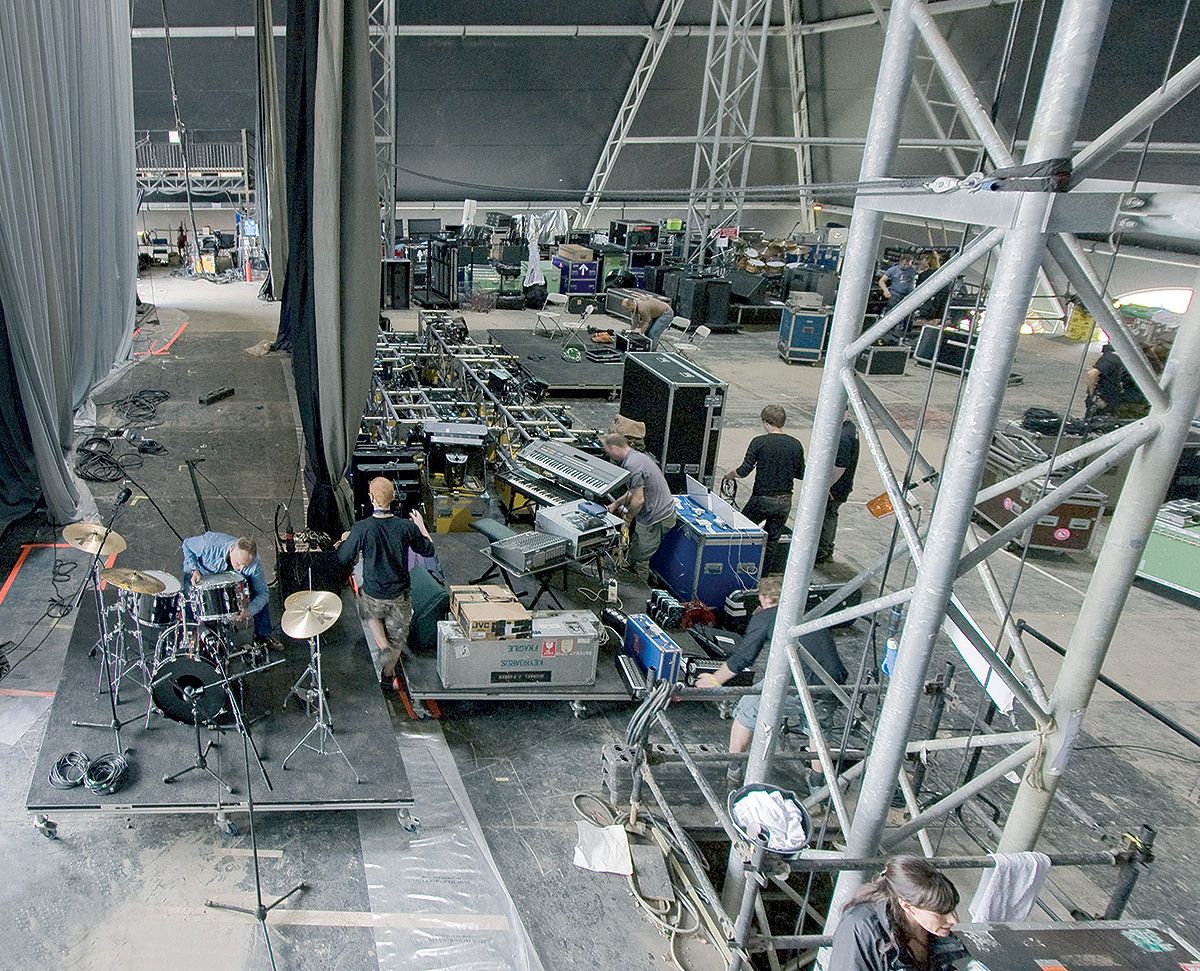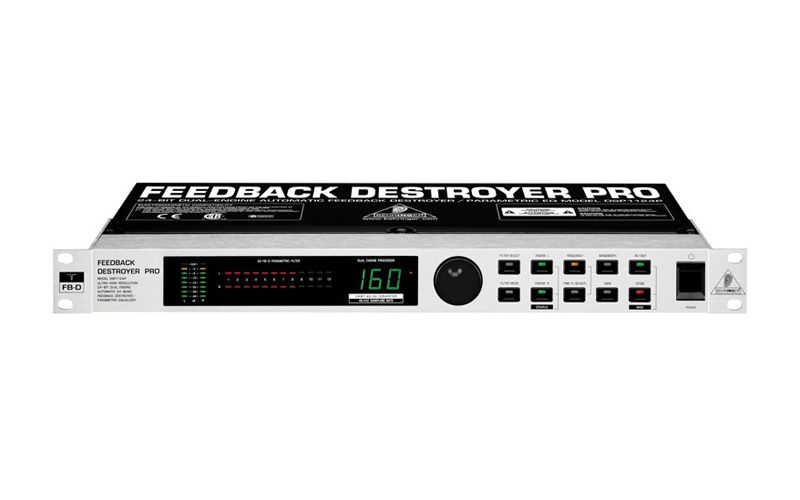In a departure from my usual writings, I'd like to share some useful experiences I've had, some things I've observed in the hope that it gives you an insight into the world of live performance at the highest level. Even though some of the stuff I'm going to talk about won't be within the budget of many people, it's still interesting to learn about how some of the biggest bands do live sound.
I have been lucky enough to go on tour with some very successful bands and get a first hand glimpse of how a really good live sound is put together. I'm not going to say who the bands were because I'm not into name dropping: suffice it to say they all have an excellent reputation for live performance! (One of my recent experiences found me working with a band that performed on the Other stage at Glastonbury 2013.)
There are loads of people scurrying about behind the scenes at any big show…
Live sound for most regular bands can be a very hit and miss sort of affair. You probably don't have your own sound guy (or girl) and even if you do, they may well have to work with whatever equipment is found at the venue. On the upside they do at least know what your songs are supposed to sound like so are able to tell if something is missing, or put delay on the vocals at specific points and things like that. In-house sound people vary wildly in competence, from hopeless to amazing. A good sound guy can really help to make a venue successful.
Going Large
The same applies to big bands, who have their own professional sound people and often a crew and a number of techies for guitars, drums and keyboards. The difference is that if you're playing to 50,000 people, there's very little room for error. If you're big enough, you take your own PA with you. If you're playing festivals you generally have to use what's there.
The key to getting a good live sound starts long before the day of the show. You need to be up to speed and very tight as a band – that much is obvious – but you also need to figure out how to do live what you did on record. If your music is 'shouty' three chord guitar punk, this might be as easy as just turning everything up to eleven. And if you're a techno act, you could be running a lot of stuff off laptops and just jumping about, pretending to play. Both of these are pretty common, but as a more accomplished band you need to take a different approach.
Bands these days can be reluctant to run anything off a backing tape (more commonly off a laptop) if it can be avoided. Audiences are often savvy enough to realise when there is far more going on in the sound than on stage. It is still done of course, and one huge band is rumoured to even go so far as to have extra players under the stage, hidden but playing along. But it's preferable to have real people on stage and use samplers and other technology to reproduce anything tricky.
Putting in the Legwork
A band that's really serious about its sound will spend hours, days and even weeks getting technical setups for individual songs exactly right and storing these presets in the side of stage and front of house mixing consoles. If the drums for one song need to sound like X and for the next song like Y, you can't swap drum kits mid-show. So you use processing in software and hardware to change the sound of the kit before it's fed to the PA. The same goes for dropping vocal and other effects in at specific points. The sound guy knows when to do this so the performer can be assured that it will happen.
All modern mixers can store entire setups and this is crucial to most bands' live sound.
There's a colossal amount of cabling and kit that makes up a big show. You might think there's a lot, but you can probably double it. I know something about hooking up sound equipment but to watch pros at work building a huge live rig is jaw-dropping. It's all pre-planned of course, and everything has its place. Time is of the essence, and you can't be fiddling about looking for spare inputs while the band hangs about waiting.
Two Different Sounds
Soundchecking is vital for any band, even more so for a show that thousands of people have paid good money to see. The setup will vary greatly between acts but you might for example have a separate drum mixer, a vocal FX board or a keyboard or guitar tech changing settings or tweaking equipment as the performers play. As I mentioned there will be a front of house desk that controls the sound being fired at the audience, and a side of stage desk that just controls the onstage monitor mixes. The stage is usually so far from the FOH booth that the FOH engineers have no idea what the sound on stage is actually like.
External effects are regularly plumbed into desks to add an extra element to the live performance.
These two sounds can be wildly different. Controlling sound on the stage is tricky: people's amps and drums are mic'ed up so you can't blast too much vocal out for example, or it gets picked up by other mics despite their being directional. If the soundcheck went well, there shouldn't be too much pointing of fingers up or down during the show as band members request more or less of something in their monitors.
Ever seen one of these in the wild? Few people have.
To an extent the band has to trust the FOH guys completely to get their sound right. The band itself can't hear what the sound is like 50 or 100ft away from the stage where most of the crowd is, only where they are on stage. They know through experience to trust that they are being made to sound good to the audience, at least as long as the sound guy is their own. If you've played gigs and thought that the sound on stage was awful, this isn't a problem confined to small bands, it can happen to anyone.
Final Thoughts
So the world of touring sound is in some ways a lot like playing any gig: soundchecks, foldback and on-the-fly adjustments, and in others not very similar at all. Days of setup, everything fine tuned and preset, and a bunch of guys to do stuff for you as you play. Next time you see a live show, have a look at what the sound guys are doing. It's fascinating…







 © 2024 Ask.Audio
A NonLinear Educating Company
© 2024 Ask.Audio
A NonLinear Educating Company
Discussion
Want to join the discussion?
Create an account or login to get started!